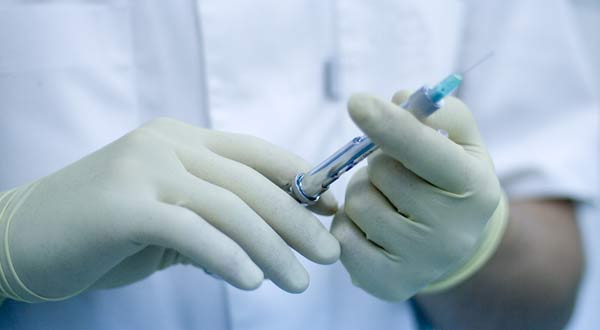HPV Vaccinations Lower Infection Rate Even Among Unvaccinated Women

The human papillomavirus vaccine (HPV) provides a benefit to women even if they are not vaccinated, via a phenomenon known as "herd immunity," a new study suggests.
Among the women in the study, there was a decrease in the percentage who were infected with the four HPV strains included in the vaccine (HPV 6, 11, 16, and 18) in the years after the vaccine was introduced, compared with earlier years.
This decrease in HPV prevalence was seen among both vaccinated and unvaccinated women, the researchers said.
The findings show that even with relatively low rates of women getting vaccinated, the vaccine produces some degree of herd immunity — protection of unvaccinated people that occurs because a critical portion of the population has been vaccinated.
However, while the findings are encouraging, "This is not reason not to get vaccinated," said study researcher Dr. Jessica Kahn, a physician of adolescent medicine at Cincinnati Children's Hospital. Kahn noted that one in four unvaccinated participants in the study were infected with a high-risk strain of HPV. A woman can also protect her partner by getting vaccinated, Kahn said.
Because the study was conducted in just one community of mainly African American women, further research is needed to confirm the results and see if the findings apply to the population as a whole.
Herd immunity
Sign up for the Live Science daily newsletter now
Get the world’s most fascinating discoveries delivered straight to your inbox.
The first HPV vaccine, called Gardasil and manufactured by Merck, was licensed for use in the United States in June 2006.
To study the effect of the vaccine, Kahn and colleagues analyzed information from two groups of sexually active women ages 13 to 26. One group consisted of 368 women who were not vaccinated, and who visited clinics in Cincinnati between 2006 and 2007. The second group consisted of 409 women who visited the clinics between 2009 and 2010, about 60 percent of whom had received at least one of the three shots in the HPV-vaccination series.
Overall, the percentage of women infected with one of the HPV strains included in the vaccine decreased from 31 percent in the group that visited the clinics between 2006 and 2007, to 13.4 percent in the group that visited in 2009 and 2010 — a 58 percent decrease.
Among women in the latter group, 9.9 percent of those who were vaccinated tested positive for HPV, while 15.4 percent of the unvaccinated women were infected.
The percentage of women infected with HPV strains not included in the vaccine increased after the vaccine's introduction, from about 60 percent to 75 percent, but the researchers said this finding should be interpreted with caution, because there is no biological reason this would happen so quickly.
Good news
The study is "good news that comes surprisingly soon," said Dr. William Schaffner, chairman of the department of preventive medicine at Vanderbilt University. Schaffner said he would have expected a larger portion of the population needed to be vaccinated, including boys, to see herd immunity.
"It's impressive if other studies can confirm it," Schaffner said.
The study is a reminder that "vaccination is not just about the individuals getting vaccinated…it's about everyone else in the community," Schaffner said.
Dr. Paul Offit, director of the Vaccine Education Center at the Children's Hospital of Philadelphia, said he would expect to see herd immunity against the strains in the vaccine starting at a vaccination rate of 40 percent, which is the national average.
The vaccine's effectiveness in reducing HPV prevalence is expected to translate into a decrease in cervical cancer in the community, Kahn said. (HPV is known to cause most cases of cervical cancer).
Because of the high prevalence of HPV strains, the findings underscore the importance of vaccinating children before they become sexually active, when they are 11 or 12 years old. And the study shows that older women, who are recommended for "catch up" vaccination, also derive a benefit, Kahn said.
The study is published in the July 9 issue of the journal Pediatrics.
Pass it on: Despite a low vaccinate rate with the HPV vaccine, researchers are starting to see the vaccine provide herd immunity.
This story was provided by MyHealthNewsDaily, a sister site to LiveScience. Follow Rachael Rettner on Twitter @RachaelRettner, or MyHealthNewsDaily @MyHealth_MHND. We're also on Facebook & Google+.

Rachael is a Live Science contributor, and was a former channel editor and senior writer for Live Science between 2010 and 2022. She has a master's degree in journalism from New York University's Science, Health and Environmental Reporting Program. She also holds a B.S. in molecular biology and an M.S. in biology from the University of California, San Diego. Her work has appeared in Scienceline, The Washington Post and Scientific American.









